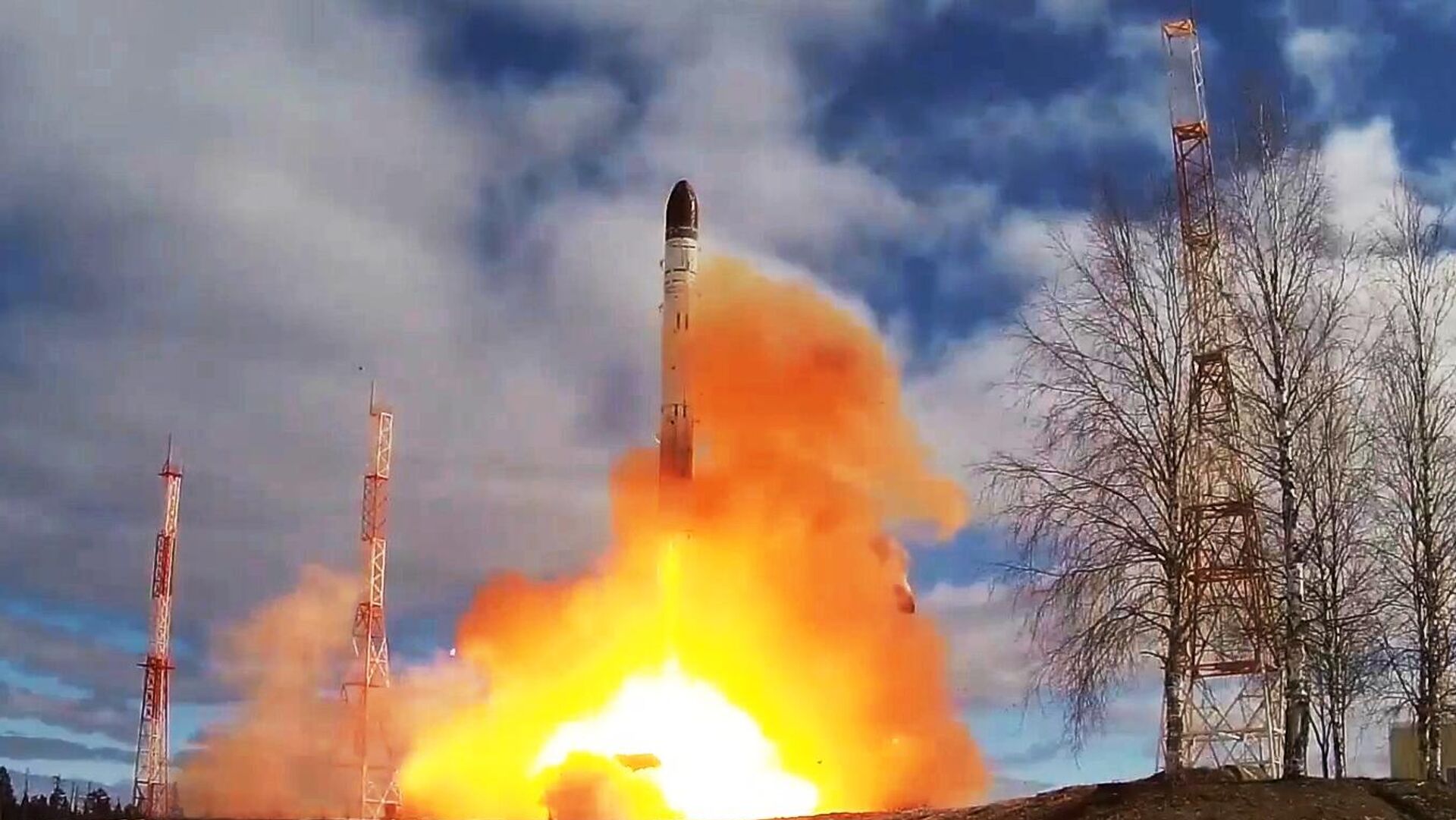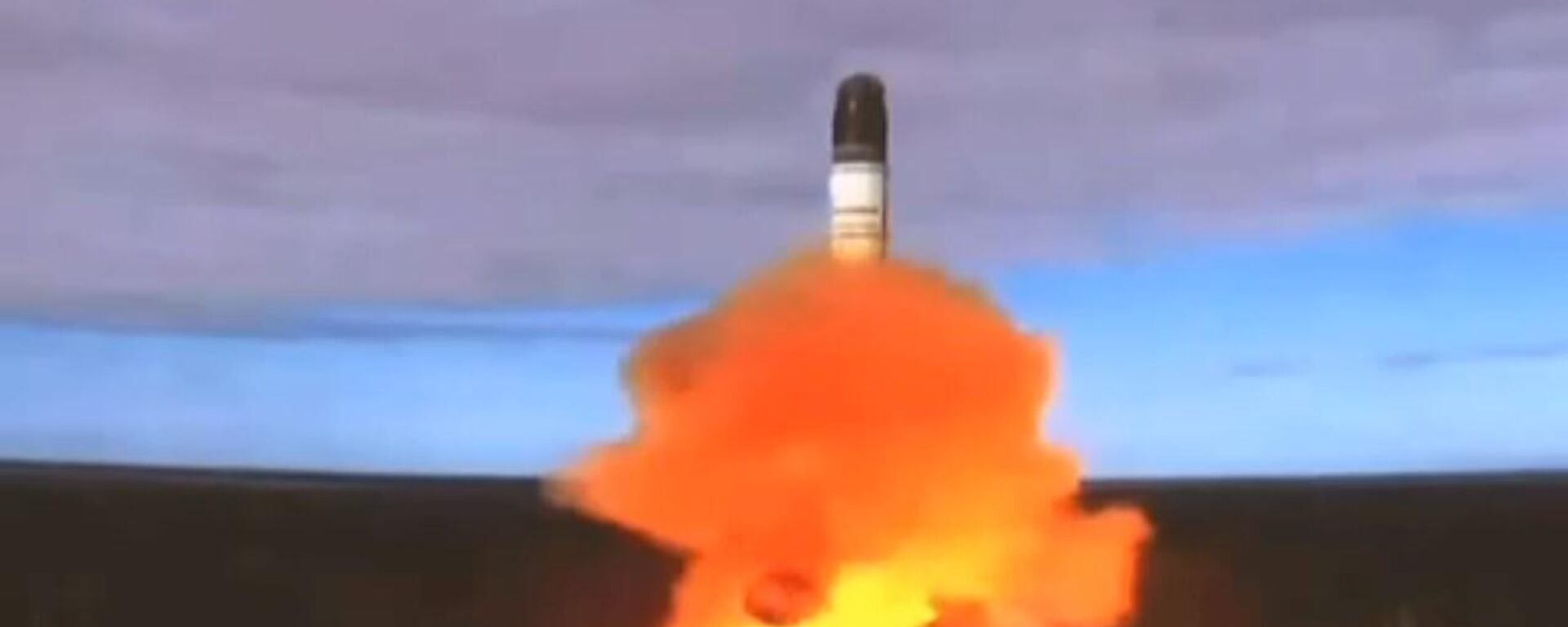https://sputnikglobe.com/20220522/russias-sarmat-icbm-can-change-trajectory-interception-hardly-possible-in-coming-decades-1095694819.html
Russia’s Sarmat ICBM Can Change Trajectory, Will Make Interception Hardly Possible in Coming Decades
Russia’s Sarmat ICBM Can Change Trajectory, Will Make Interception Hardly Possible in Coming Decades
Sputnik International
PETROPAVLOVSK-KAMCHATSKIY (Sputnik) - Sarmat, Russia’s newest land-based intercontinental ballistic missile (ICBM), can fly over the North and South Poles and... 22.05.2022, Sputnik International
2022-05-22T01:44+0000
2022-05-22T01:44+0000
2022-05-22T01:54+0000
russia
military & intelligence
military equipment
missile tests
missile
intercontinental ballistic missile (icbm)
https://cdn1.img.sputnikglobe.com/img/07e6/05/16/1095694793_0:0:1357:764_1920x0_80_0_0_76a33939939af8beeab8bf6b82752526.jpg
"Due to the power-to-weight ratio of the new missile system, the trajectory has the ability to change. From our notorious trajectory through the North Pole, if necessary, it is possible to lay a trajectory through the South Pole, which, in principle, is not protected today. And there are also possibilities for other trajectories - in terms of the possibility of launching into outer space," Karakaev told the Zvezda TV channel.He added that, in the coming decades, it will be hardly possible to create a means of intercepting Sarmat.He clarified that one of the reasons why Sarmat will be so hard to intercept is that, while being a liquid-propellant rocket, it accelerates almost as fast as missiles with lightweight solid rocket motors.Russia will be testing Sarmat throughout this year and the military will start receiving the missiles in the fall of 2022 , according to Dmitry Rogozin, the head of Russian state-run space agency Roscosmos.Moreover, according to Sergei Poroskun, a deputy commander of the Strategic Missile Forces, the Sarmat missile will be in service for at least 50 years.In late April, Roscosmos said it plans to begin serial deployments of the intercontinental ballistic missile to Russian strategic missile forces this fall.Sarmat is a large missile system with a 200-tonne intercontinental liquid-propellant ballistic missile. The system is designed to replace Russia's Voevoda missiles, also known as Satan. Roscosmos plans to construct a total of 46 Sarmat missiles for the needs of the Russian military.
https://sputnikglobe.com/20220424/russias-sarmat-icbm-could-be-deployed-with-several-avangard-hypersonic-glide-vehicles-1095016959.html
Sputnik International
feedback@sputniknews.com
+74956456601
MIA „Rossiya Segodnya“
2022
Sputnik International
feedback@sputniknews.com
+74956456601
MIA „Rossiya Segodnya“
News
en_EN
Sputnik International
feedback@sputniknews.com
+74956456601
MIA „Rossiya Segodnya“
Sputnik International
feedback@sputniknews.com
+74956456601
MIA „Rossiya Segodnya“
military & intelligence, military equipment, missile tests, missile, intercontinental ballistic missile (icbm)
military & intelligence, military equipment, missile tests, missile, intercontinental ballistic missile (icbm)
Russia’s Sarmat ICBM Can Change Trajectory, Will Make Interception Hardly Possible in Coming Decades
01:44 GMT 22.05.2022 (Updated: 01:54 GMT 22.05.2022) PETROPAVLOVSK-KAMCHATSKIY (Sputnik) - Sarmat, Russia’s newest land-based intercontinental ballistic missile (ICBM), can fly over the North and South Poles and along other trajectories, Col. Gen. Sergei Karakaev, commander of Russia’s Strategic Missile Forces, said.
"Due to the power-to-weight ratio of the new missile system, the trajectory has the ability to change. From our notorious trajectory through the North Pole, if necessary, it is possible to lay a trajectory through the South Pole, which, in principle, is not protected today. And there are also possibilities for other trajectories - in terms of the possibility of launching into outer space," Karakaev told the Zvezda TV channel.
He added that, in the coming decades, it will be hardly possible to create a means of intercepting Sarmat.
"...today, they say that air defense does not exist for the Sarmat missile system, and it probably will not exist in the coming decades," Karakaev predicted.
He clarified that one of the reasons why Sarmat will be so hard to intercept is that, while being a liquid-propellant rocket, it accelerates almost as fast as missiles with lightweight solid rocket motors.
Russia will be testing Sarmat throughout this year and the military will start receiving the missiles in the fall of 2022 , according to Dmitry Rogozin, the head of Russian state-run space agency Roscosmos.
Moreover, according to Sergei Poroskun, a deputy commander of the Strategic Missile Forces, the Sarmat missile will be in service for at least 50 years.
"This is a promising missile system that will be on combat duty for the next 50 years," Poroskun said, adding that the long time of service is due to the missile's characteristics and its high reliability.
In late April, Roscosmos
said it plans to begin serial deployments of the intercontinental ballistic missile to Russian strategic missile forces this fall.
Sarmat is a large missile system with a 200-tonne intercontinental liquid-propellant ballistic missile. The system is designed to replace Russia's Voevoda missiles, also known as Satan. Roscosmos plans to construct a total of 46 Sarmat missiles for the needs of the Russian military.



